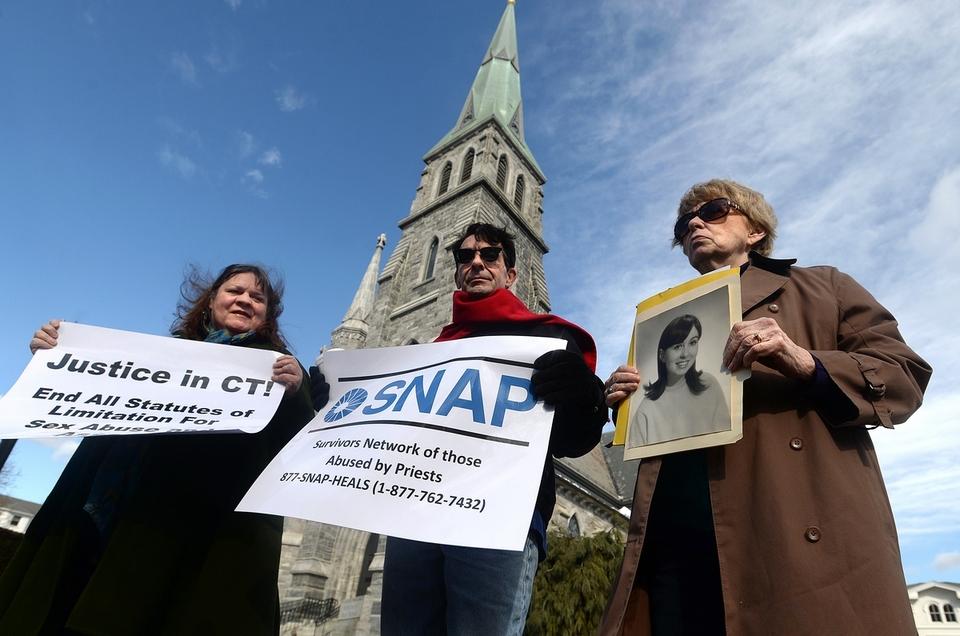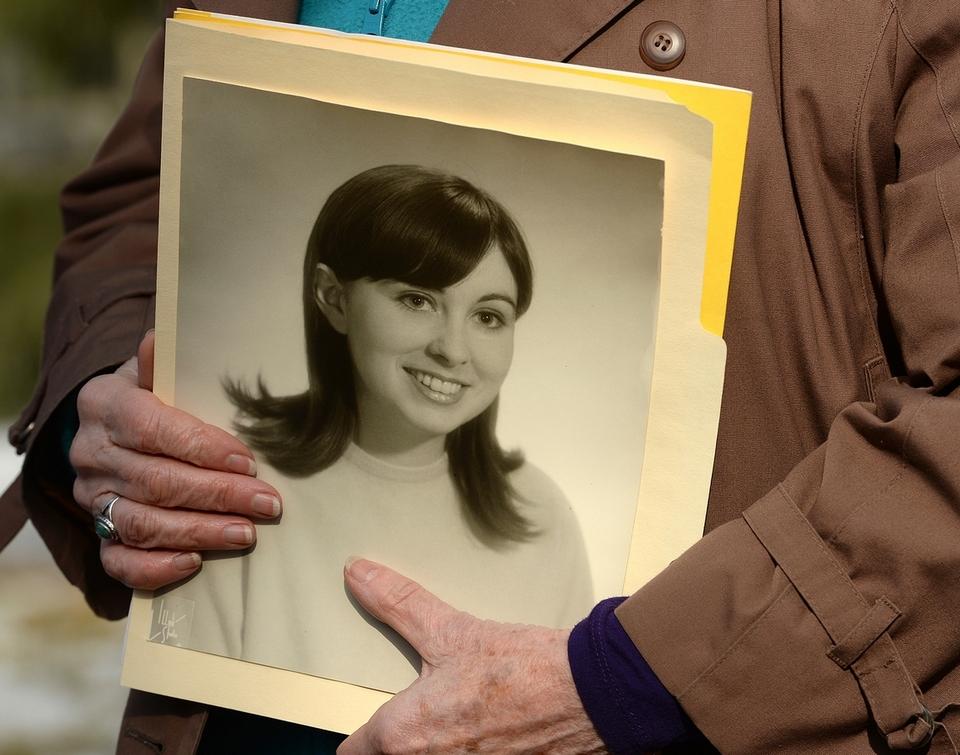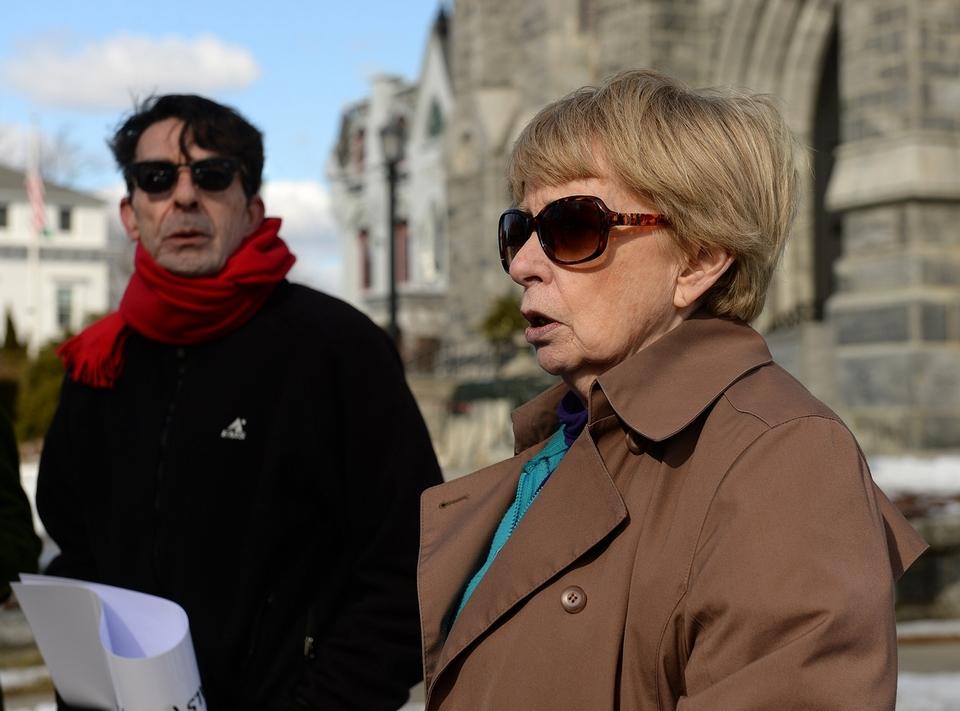SNAP Calls for State to Set up Hotline to Report Abuse by Priests
By Joe Wojtas
The Connecticut chapter of the Survivors Network of Those Abused by Priests on Wednesday called on Chief State’s Attorney Kevin Kane to set up a hotline to receive complaints from people who say they were abused by Catholic priests in the state. In addition, Gail Howard said her organization has identified three priests, in addition to the six priests and brothers identified by The Day, who were not included on the list of 43 substantively accused of sexually assaulting minors that was released by the Diocese of Norwich on Sunday. Howard, who made the comments during a Wednesday afternoon news conference in front of the Cathedral of St. Patrick, which is just yards from Bishop Michael Cote’s office, also called on the diocese to release more information about those on the list, such as what parishes and schools they served at. “We need to know where these offenders worked and what parishes allowed them to have access to children,” said Howard, who was accompanied by John “Tim” McGuire of New London, who alleged last summer that, when he was 8 and an altar boy at St. Joseph's Church in Noank, the late James Curry molested him. The diocese’s list also did not say what the priests were accused of doing and whether the diocese reported them to police or the state Department of Children and Families, which clergy have been required to do under the state’s mandatory reporter law since 1971. While all but 10 of the priests on the list are deceased, Howard said SNAP wants to know where the ones who are alive are now living. “These are people who are a danger to children now. They need to be watched carefully,” she said. According to the diocese’s list, diocesan priests such as Richard Buongirno and R. Thomas McConaghy still are alive.
According to past reporting by The Day, a teen claimed Buongirno had sexually abused him in the 1970s and former Bishop Daniel Reilly then assigned Buongirno to churches in Cromwell and Middletown, where pastors later said they saw him bring boys into his private room. A few years earlier, a 9-year-old boy said Buongirno had repeatedly molested him while assigned to St. Matthias Church in East Lyme and then said the priest repeatedly sexually assaulted him again when he was a 16-year-old high school student. The diocese said only that McConaghy was ordained in 1981 and removed from ministry in 2005. The Day has found that he served at St. Andrew Church in Colchester from 1981 to 1983, St. Patrick Cathedral in Norwich from 1983 to 1985, St. Michael Church in Pawcatuck from 1990 to 1991, Sacred Heart Church in Norwich and St. John Mission Church from 1998 to 2005. Howard said the diocese’s list comes 17 years after the Catholic Church promised transparency on the issue of clergy sex abuse in the wake of the 2002 scandal that enveloped the Boston Diocese. Howard said the church is known for keeping extensive records on sex abuse cases and charged that withholding names is a way for it to minimize damage and make the problem not seem as bad as it is. Other critics of the church say it is way to minimize exposure to lawsuits. Missing priests SNAP says the following three priests should be added to the list: The late Kieran T. Ahearn, who worked in numerous parishes in four states in the 1980s and 1990s, including St. Pius X in Middletown, and was found guilty of molesting a 16-year-old he met on a ski vacation. Joseph Owens, who was included on a list of credibly accused priests released by the USA Northeast Jesuit Province last month and who worked in Middlefield at an organization called New Coalition in 1978-79. The late George St. Jean, a Norwich diocese priest who Catholic records show was assigned to a retreat house in Willimantic in the early 1960s, and was accused in a lawsuit of sexually assaulting a New Hampshire boy more than 100 times and had multiple complaints against him.
Diocesan spokesman Wayne Gignac said this week that in order to be included on the list, the victim had to be under 18, there needed to be a formal report made to the diocese (“please refer to the January 7th letter that went out to parishioners regarding the reporting process”) and the allegation “needed to have substance.” The latter was defined as an allegation in which the accused pleaded guilty or no contest or was found guilty in criminal court of any incident of sexual misconduct with a minor; an allegation that was investigated and determined to be reasonable, plausible, probable and bearing the semblance of truth; or an allegation that was corroborated with other evidence or another source and/or been acknowledged or admitted to by the accused. 'Tip of the iceberg' Howard said she believes there are many more priests who sexually assaulted minors than those on the Norwich list and a similar list of 48 priests released by the Archdiocese of Hartford a few weeks ago. “I think we’re looking at the tip of the iceberg,” she said. Howard also said that the diocese’s list also should include priests accused of sexually assaulting adults. She praised the courage of Deacon Mark King, who served with the Rev. Gregory Mullaney at Sacred Heart Church in Groton and revealed last fall that Mullaney tried to sexually assault him on a 2006 trip to Rome. King gave a sworn statement to the diocese about the incidents within hours upon returning home. This fall, Mullaney acknowledged the incidents occurred but the diocese said he remains a priest in good standing. “We want to know the extent of sexual abuse in the diocese. What about other adults and seminarians?” she said, adding that she is now speaking with women who say they were physically and sexually assaulted by nuns in the state. Howard said that since the Pennsylvania attorney general released a grand jury report last summer that found more than 1,000 people had been sexually assaulted by 300 priests there, she consistently has received calls from victims in Connecticut who had not previously come forward publicly. She said she expects to receive more calls from victims in the Norwich diocese now that the list has been released. She said she can be reached at (203) 644-0387, while the national SNAP office is at (877) SNAP-HEAL. SNAP calls for state investigation Howard reiterated that her organization, which provides support for victims, wants state Attorney General William Tong and Kane to begin an investigation into the extent of sexual abuse by priests and the Catholic Church’s role in covering it up. Such probes are underway in 20 other states. “The entire populace wants to know what the extent of this criminal activity is. If we wait for the Catholic church, we’ll never get it,” she said. McGuire criticized the church for determining which allegations are credible instead of having an outside entity make the decision. Kane was not immediately available late Tuesday afternoon to comment on SNAP's request for a hotline. In an interview last week, Kane said the state’s restrictive grand jury statute does not allow him to begin a wide-ranging probe of the Catholic church. Kane said that his office needs people to come forward with allegations that fall within the statute of limitations for prosecution, which can then be investigated. He said it would not be an efficient use of his office’s resources to investigate allegations against deceased priests. And he said he is not inclined to send police out to knock on doors of potential victims, as that may be traumatic for them. In many of the cases, the priests are dead or the statute of limitations expired, except in the case of the most heinous sexual assaults. Currently just three sexual assault offenses can be prosecuted at any time: first-degree sexual assault (rape) when force or the threat of force is used and the victim is under 16 or the victim is under 13 and the offender is more than two years older; first-degree aggravated sexual assault when the victim is under 16, and aggravated sexual assault of a minor. Otherwise, the current criminal statute of limitations for minor victims is up to the victim’s 48th birthday or five years from when the victim notified police of the crime, whichever is shorter. Tong declined to be interviewed on the topic through his spokeswoman Jaclyn Severance last month. She did say that “unlike most states, Connecticut’s attorney general does not have jurisdiction over criminal matters and therefore has no authority to investigate or prosecute potential criminal matters. That jurisdiction rests with the Connecticut Division of Criminal Justice, which is led by the chief state’s attorney. We will continue to monitor developments with clergy sex abuse claims to review whether any aspect would fall within the civil law authority of this office.” Howard said Wednesday that if there is a barrier to an investigation of the church, then the General Assembly should change the law to allow one. The legislature is considering six related bills that would extend or eliminate the state’s statute of limitations for filing charges in sexual assault cases, as well as possibly eliminating the statute of limitations for filing civil lawsuits. If this occurred, living priests could face criminal charges and dioceses likely would face a large number of new lawsuits by alleged victims who currently are prohibited from filing lawsuits after their 48th birthday. Contact: j.wojtas@theday.com
|
.
Any original material on these pages is copyright © BishopAccountability.org 2004. Reproduce freely with attribution.


